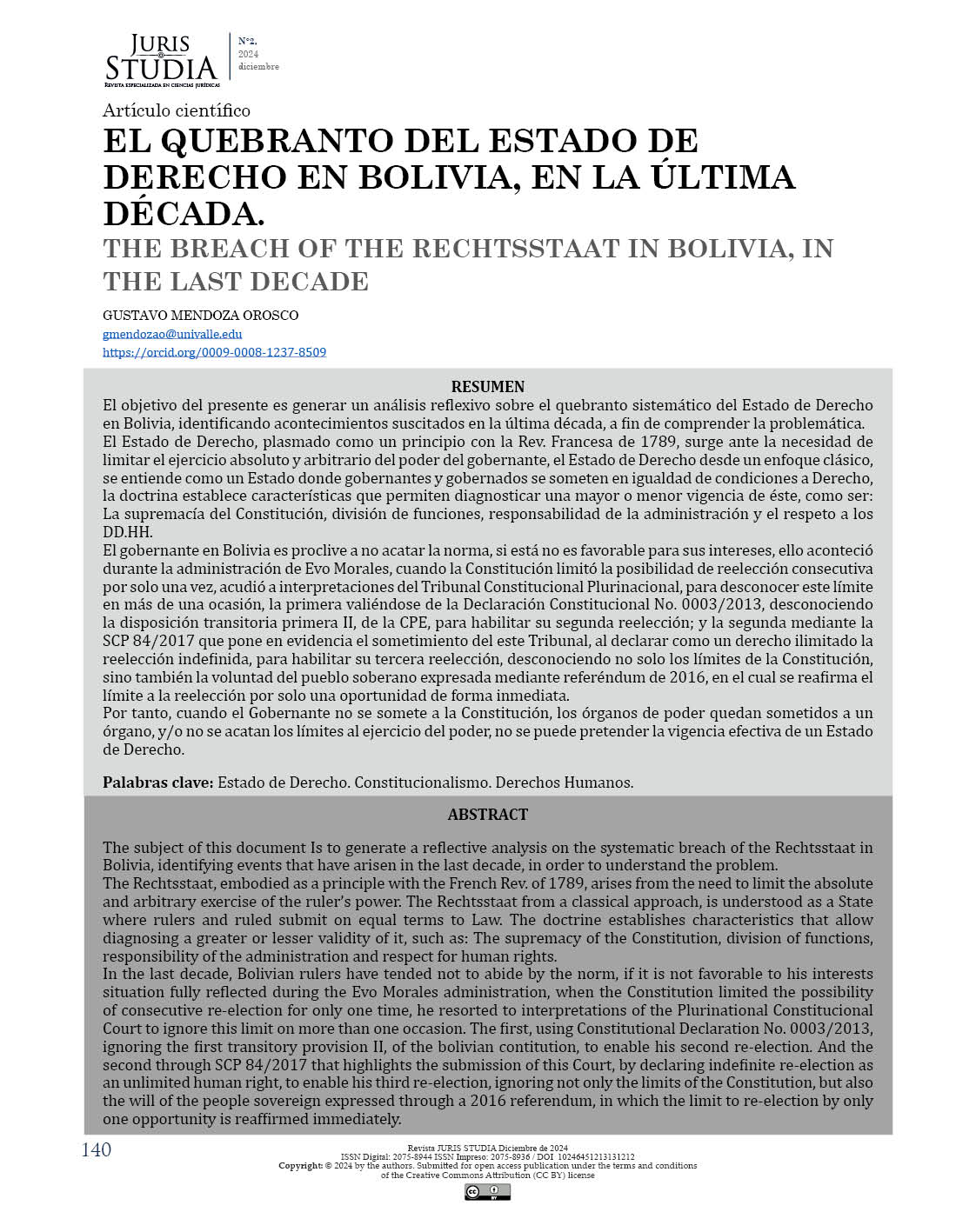THE BREACH OF THE RECHTSSTAAT IN BOLIVIA, IN THE LAST DECADE
DOI:
https://doi.org/10.52428/30074320.v1i2.1130Keywords:
Rechtsstaat, Constitutionalism, Human rightsAbstract
The subject of this document Is to generate a reflective analysis on the systematic breach of the Rechtsstaat in Bolivia, identifying events that have arisen in the last decade, in order to understand the problem.
The Rechtsstaat, embodied as a principle with the French Rev. of 1789, arises from the need to limit the absolute and arbitrary exercise of the ruler's power. The Rechtsstaat from a classical approach, is understood as a State where rulers and ruled submit on equal terms to Law. The doctrine establishes characteristics that allow diagnosing a greater or lesser validity of it, such as: The supremacy of the Constitution, division of functions, responsibility of the administration and respect for human rights.
In the last decade, Bolivian rulers have tended not to abide by the norm, if it is not favorable to his interests situation fully reflected during the Evo Morales administration, when the Constitution limited the possibility of consecutive re-election for only one time, he resorted to interpretations of the Plurinational Constitucional Court to ignore this limit on more than one occasion. The first, using Constitutional Declaration No. 0003/2013, ignoring the first transitory provision II, of the bolivian contitution, to enable his second re-election. And the second through SCP 84/2017 that highlights the submission of this Court, by declaring indefinite re-election as an unlimited human right, to enable his third re-election, ignoring not only the limits of the Constitution, but also the will of the people sovereign expressed through a 2016 referendum, in which the limit to re-election by only one opportunity is reaffirmed immediately.
Therefore, when the ruler does’nt submit to the Constitution, the organs of power remain subject to one of them, and/or not respect the limits to the exercise of power, the effective validity of a Rechtsstaat cannot be claimed.
References
Constitución Política del Estado, de 7 de febrero de 2009
Tribunal Constitucional Plurinacional, Declaración Constitucional No. 0003/2013, de 25/04/2013
Tribunal Constitucional Plurinacional, Sentencia Constitucional Plurinacional No. 0084/2017 de 28/11/2017
Corte interamericana de Derechos Humanos, Opinión Consultiva 28/2021 de 7/06/2021 https://www.ipsos.com/sites/default/files/2017-02/Referendo_Constitucional_2016.pdf

Downloads
Published
How to Cite
Issue
Section
License
Copyright (c) 2024 Gustavo Mendoza Orosco

This work is licensed under a Creative Commons Attribution 4.0 International License.
Authors who publish with this journal agree to the following terms:
- Authors retain copyright and grant the journal right of first publication with the work simultaneously licensed under a Creative Commons Attribution License 4.0 that allows others to share the work with an acknowledgement of the work's authorship and initial publication in this journal.
- Authors are able to enter into separate, additional contractual arrangements for the non-exclusive distribution of the journal's published version of the work (e.g., post it to an institutional repository or publish it in a book), with an acknowledgement of its initial publication in this journal.
- Authors are permitted and encouraged to post their work online (e.g., in institutional repositories or on their website) prior to and during the submission process, as it can lead to productive exchanges, as well as earlier and greater citation of published work.










